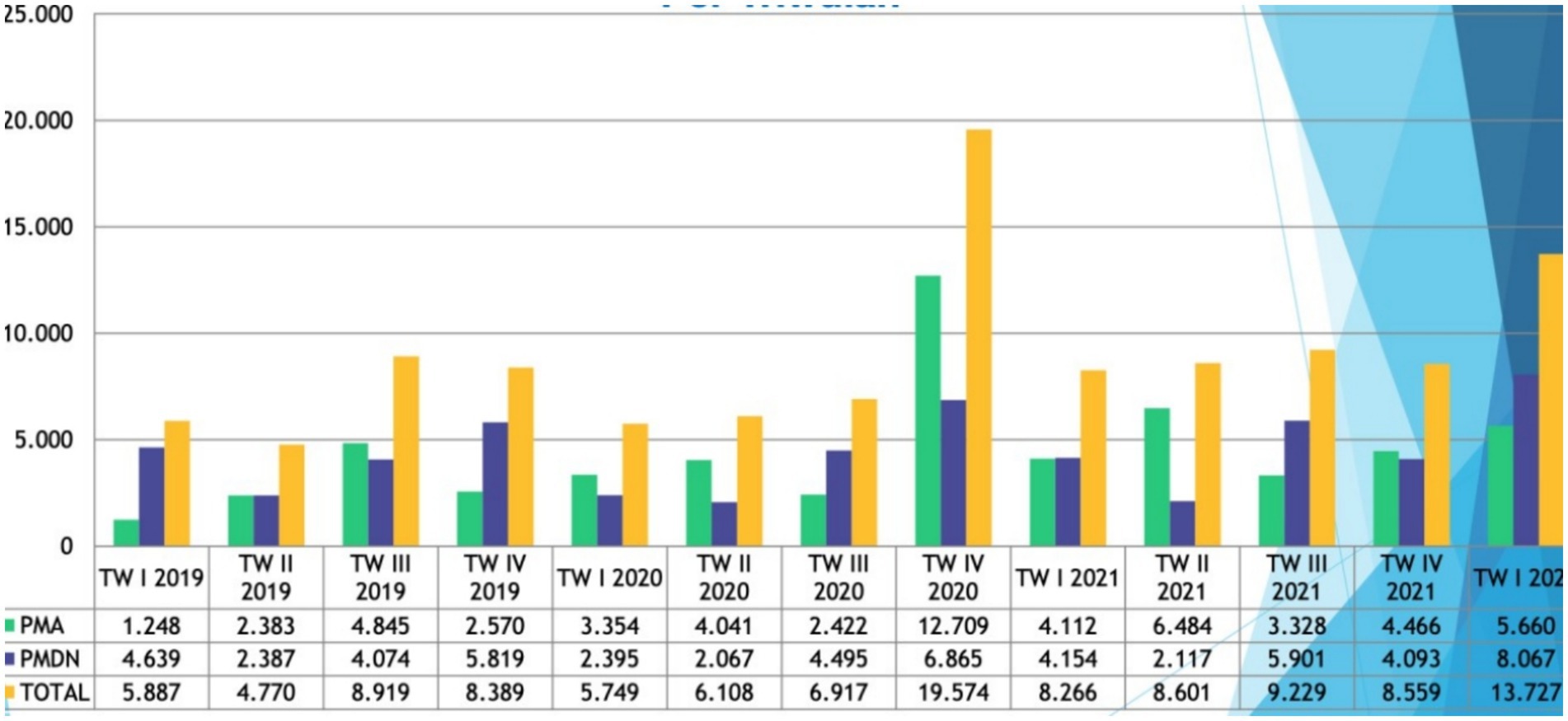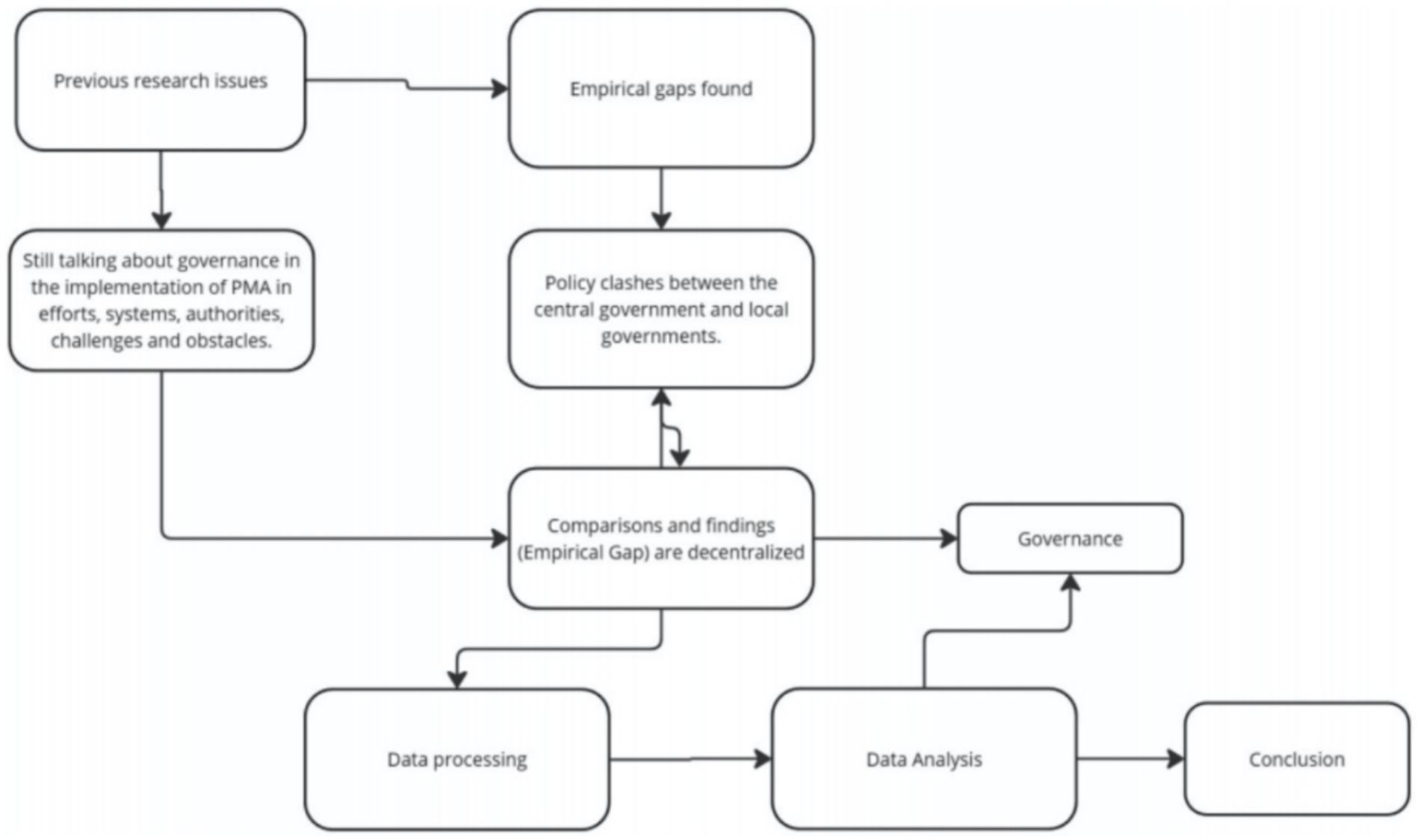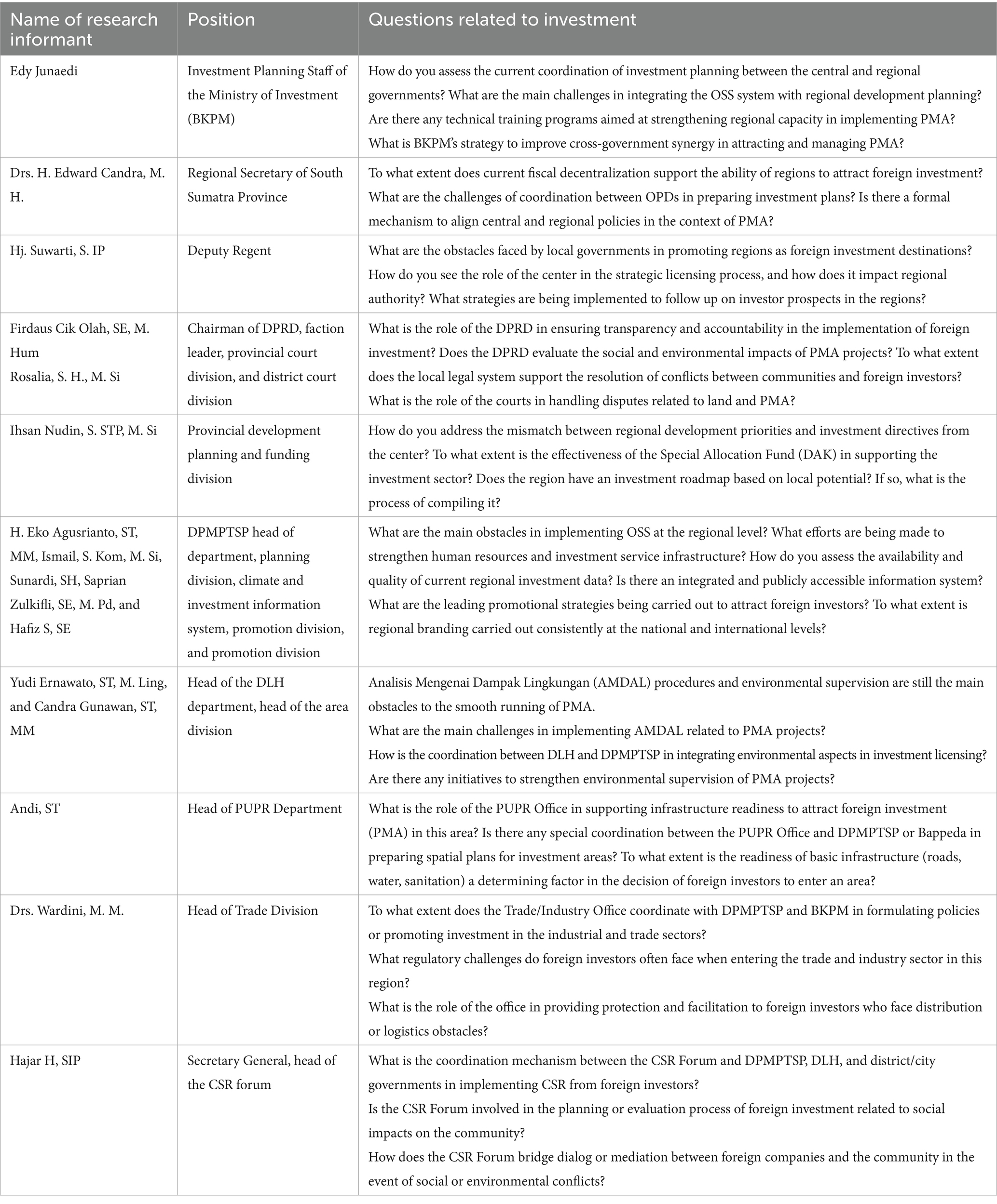- 1Government Science, FISIP Musi Rawas University, and Government Science FISIP Diponegoro University, Semarang, Indonesia
- 2Government Science, Faculty of Social and Political Sciences, Diponegoro University, Semarang, Indonesia
- 3Bussines Administration, Faculty of Social and Political Sciences, Diponegoro University, Semarang, Indonesia
Background and objectives: This study explores the local governance dimension of South Sumatra, Indonesia, in the implementation of foreign investment (FI) and explains that local governments have the authority to regulate policies or only become facilitators in the provision of public goods and services. This study argues that local governments are still weak in managing foreign investment because they do not have full authority. This study addresses the problem of foreign investment in decentralization in Indonesia. Various political factors, including approving policies, granting political access, political lobbies, and agenda-setting, are important issues that need to be addressed.
Methods: The method used in this study employed a qualitative approach. The interview was conducted in several areas of South Sumatra province, such as Musi Rawas, Musi Rawas Utara, Empat Lawang, Lahat, and Musi Banyuasin. All analyses were performed using NVivo 12 plus.
Findings: The results of this study indicate that decentralization can increase the growth of economic and social development in a region because it promotes regional transparency, accountability, and responsiveness. However, a weakness of the local government is the absence of authority in the administrative capability of foreign investment. This is because the region is a facilitator and supervisor, following only central government regulations
Introduction
The discussion on the Perspective of Governance in Indonesia has become a focus of social and political scientists (Widiwati L. et al., 2023). As one of the countries that uses the governance system in the concept of decentralization, the decentralization of foreign investment (FI) in Indonesia’s politics does not have a significant impact (Kooiman, 2003; Kaufmann et al., 2000; Fukuyama, 2016a, 2016b). Kaufmann (2005). It provides limited space for local governments to allocate policy systems or administrative capacity, especially FI in Indonesia. Intrinsic approaches, such as the way in which the Indonesian central government gives trust to local governments to act, have not been discussed comprehensively by social and political academics. For example, the central government controls the general policies and regulations related to FI. However, in practice, the implementation and enforcement of these policies are often carried out by local governments or actors who have direct authority to regulate FI in the region.
In the context of public service quality, administrative capacity, and policies in local government organizations, three main concepts are the focus of the study: governance and decentralization. Governance aims to realize good governance by strengthening the role of local governments in formulating public policies and increasing accountability (Leonardo, 2011; Zulkenedi et al., 2023). Meanwhile, decentralization is an important element in governance in Indonesia, which aims to increase the effectiveness of public services and strengthen regional autonomy (Zulkenedi et al., 2023). Based on these conditions, researchers are interested in further examining the concept of decentralization, especially in the context of FI. Although many studies have been conducted on the relationship between decentralization and FI, it seems that various problems, such as disharmony of authority, overlapping regulations, and weak coordination between levels of government, are still challenges that have not been resolved comprehensively, as depicted in Figure 1.
From a theoretical perspective, Figure 1 reflects the weak capacity of provincial governments in managing FI to realize good governance. Therefore, more structured policy reforms are needed to improve the effectiveness of decentralization in the foreign investment sector. In response to these conditions, the South Sumatra Provincial Government has implemented various strategies to attract FI investment. Further explanation regarding the trend of increasing investment and its impact on the Anggaran Pendapatan dan Belanja Negara (APBN) is shown in Figure 1. It shows an increase in FDI from 2019 to 2023 in South Sumatra Province. Data Source: Investment Realization of LKJIP South Sumatra Province in 2023. Moreover, Figure 1 also shows the realization of FI decreased in 2019, 2021, and 2022. In 2019, the value of FI investment was recorded at IDR 11.04 trillion, with a performance achievement of 66.11% of the target set, which was IDR 16.71 trillion. In addition, the number of workers absorbed in that year reached 8,372 people. In 2021, there was a decrease in FI realization of 0.74%, which was caused by several obstacles, including (1) Land problems hamper the investment process. (2) Limited road access disrupts investment distribution and operations. (3) The non-operation of several companies reduces investment realization. Furthermore, in 2022, FI realization only reached 86.81% of the target. This decline was mainly influenced by the impact of the COVID-19 pandemic, which caused many investors to reduce or postpone their investments in Indonesia, including South Sumatra Province. From the achievement of the target and realization of FI in South Sumatra Province, it can be seen that the performance indicator was calculated based on the total number of FI investor recapitulations. In 2022, the number of FI companies realized reached 1,005 companies from the target of 369 companies, with an achievement percentage of 255.72%. Compared to 2021, investment realization was recorded at 571 companies from the target of 369 companies, with an achievement of 154.74%.
Meanwhile, in 2020, 629 companies were realized, and in 2019, realization was recorded at 439 companies. The final target of the Strategic Plan (Renstra) for 2023 was set at IDR 21.90 trillion. However, until the third quarter of 2022, performance realization still has not reached the final target. In 2023, the realization of FI increased compared to previous years, reaching IDR 21.88 trillion from the target of IDR 21.90 trillion, with an achievement percentage of 99.91%. Meanwhile, the final target of the 2023 Renstra is IDR 23.45 trillion, so the realization of performance until the end of 2023 has not fully reached the target (Ministry of Investment/BKPM).
One of the factors influencing this is the change of leadership and changes in the organizational structure of the regional government in South Sumatra Province. Some of the issues in the identification of the problems presented in the previous section, a main question arises in this study is the extent of the role of local governments in the authority of FI? What is the administrative capability of the local government of South Sumatra in terms of governance?
Research methods
This study is grounded in the extensive body of classical and contemporary literature on workplace environment and employee productivity. Robbins and Judge (2017) argue that a conducive work environment is one of the key determinants of employee performance, a view consistent with Sedarmayanti (2011), who emphasizes the importance of both physical and non-physical aspects of the workspace in supporting productivity. In the Indonesian context, empirical studies by Handoko (2011) and Sutrisno (2016) have demonstrated variations in the influence of workplace environment on employee performance across institutions, shaped by organizational culture and the availability of facilities.
Methodologically, this research adopts a quantitative descriptive approach, following the principles outlined by Sugiyono (2019). The primary data collection instrument is a closed-ended questionnaire, developed based on workplace environment indicators proposed by Sedarmayanti (2011), which include cleanliness, lighting, air circulation, temperature, availability of equipment, supporting facilities, interpersonal relations, supervisory guidance, motivation, and the overall impact of the work environment on productivity.
The local context of this research is situated in the Department of Communication, Informatics, Statistics, and Encryption of Lubuklinggau City, South Sumatra. Policy documents from the Central Statistics Agency, Lubuklinggau City (2023) and the Government of South Sumatra Province (2023) and BPS South Sumatra Province (2023) provide a concrete description of existing service standards and workplace management practices. Employee participation is also reflected through their direct involvement in assessing the conditions of their daily work environment.
To strengthen the validity of findings, the research design follows the field survey guidelines of Creswell (2013) and Yin (2018), enabling an in-depth exploration of employee perceptions. Data analysis was conducted quantitatively using tabulation and frequency distribution techniques, which were then interpreted to identify prevailing trends in employee perceptions regarding the workplace environment and its relationship to productivity. The method used in this study is a qualitative approach focusing on the South Sumatra Province. The core dimensions measured include the political process, administrative capacity, and public legitimacy (Cheema and Rondinelli, 2007; Smoke, 2003). This research explores how decentralized administrative capacities are managed and investigates contemporary governance issues related to Foreign Direct Investment (FDI) in Indonesia, particularly within South Sumatra.
As emphasized by Turner and Hulme (1997), institutional configuration plays a vital role in supporting responsive and accountable governance. Similarly, Cheema and Rondinelli (2007) argue that the effectiveness of decentralization depends significantly on the institutional structures that facilitate authority transfer to local governments, including clarity of authority, administrative capacity, and coordination between central and local entities.
This study attempts to bridge two objectives. First, to analyze the dimensions of governance in the implementation of FDI in South Sumatra. Second, to demonstrate the roles of local governments, either as regulatory authorities in implementing policies or as facilitators in delivering public services. The overall research framework is illustrated in Figure 2.
A contextual analysis was undertaken using data gathered from field observations conducted between September and October 2023 across 17 districts and 6 cities in South Sumatra. These regions exhibited varying levels of FDI inflow and revealed disparities in institutional and fiscal capacity (Fitrani et al., 2005; Kuncoro, 2004). The fieldwork identified the dominant influence of central government actors in strategic decisions, while local governments primarily performed deconcentration functions and facilitative roles.
The study employed a case study design as recommended by Yin (2018), allowing in-depth exploration of policy actor dynamics and central-local interactions. Qualitative data analysis followed the spiral model proposed by Creswell (2013) with theory-based data analysis techniques developed by Denzin and Lincoln (2011), and refined through Miles et al. (2014), involving coding, thematic clustering, and narrative interpretation. NVivo 12 software (QSR International, 2020) was used to manage qualitative data efficiently.
Document reviews were conducted on national and provincial policies (Pemerintah Republik Indonesia, 2014, 2023; Pemerintah Provinsi Sumatera Selatan, 2023), supplemented by local observations on participatory governance and empowerment, as discussed in Widiwati et al. (2023).
Ultimately, this study contributes both theoretically and empirically to understanding the intersection of decentralization, institutional capacity, and FDI governance. It provides strategic recommendations for enhancing subnational investment governance to foster successful and sustainable FDI implementation in Indonesia. Research informants in data collection are listed in Table 1.
Result and discussion
Governance in South Sumatra Province, especially in the context of the decentralization of FI. The focus of this research is directed at analyzing three main dimensions of regional governance: (1) public service, (2) administrative capacity, and (3) policy (Kaufmann et al., 2010). The method used in this study uses a qualitative method that is collaborative in increasing and making FDI successful in South Sumatra. The measurement consists of three dimensions: the political process, administrative capacity, and public legitimacy. This study highlights the issue of regional governance in the implementation of FI policies delegated by the central government to regional governments, especially in the Province of South Sumatra. The main focus of the analysis lies in three fundamental aspects of governance: authority, power, and institutional access, which are important indicators in measuring the quality of policy implementation at the regional level.
One of the dimensions considered most crucial in the success of FI governance is administrative capacity. This capacity is reflected in the quality of public services, the management of investment standard operating procedures (SOPs), and regional budget management systems. The research findings show that although authority has been given by the central government to the governor, there has been a more technical transfer of authority to the Provincial DPMPTSP, which then carries out monitoring, supervision, and control functions for the implementation of FI by the DPMPTSP at the district/city level. This shows a vertical governance structure that remains functionally coordinated.
However, this study also identified a tendency toward a one-sided view (single perspective) among regional officials, namely, viewing governance only from the internal perspective of the regional government itself. This narrow approach hampers policy integration and coordination between sectors and regions, thus impacting the effectiveness of FI policy implementation, which is less than optimal in supporting the direction of national policy. These issues are of interest to many levels of government, regardless of the level or distinction of the power and authority of the central government in the implementation of FI in these regions. Therefore, the researcher in this study decentralized the administrative capacity. There are several reasons why decentralizing administrative capabilities in FI is one of the reasons.
This reinforces that organizational structure and institutional performance at the provincial and district/city levels play a significant role in shaping administrative capacity. This confirms that the success of FI governance is not only determined by policies made at the central level but also depends heavily on the capabilities of regional institutions in carrying out the delegated mandate. This was further clarified through data visualization generated from data processing using NVivo Plus.
Based on Figure 3, it is clearly seen that the DPMPTSP of South Sumatra Province plays a strategic role in carrying out the administrative function of managing FI. This role includes three main stages: planning, implementation, and supervision. In this context, the DPMPTSP of South Sumatra Province not only acts as a technical implementer but also as a policy director that influences the course of government governance at the district/city level. The strength of the influence of the DPMPTSP Province on district/city regional governments can be seen from its ability to encourage improvements in the quality of governance, especially through the development of professional and highly competitive human resources (HR). This is an important foundation for developing regional potential and for increasing the promotion and attraction of FI.
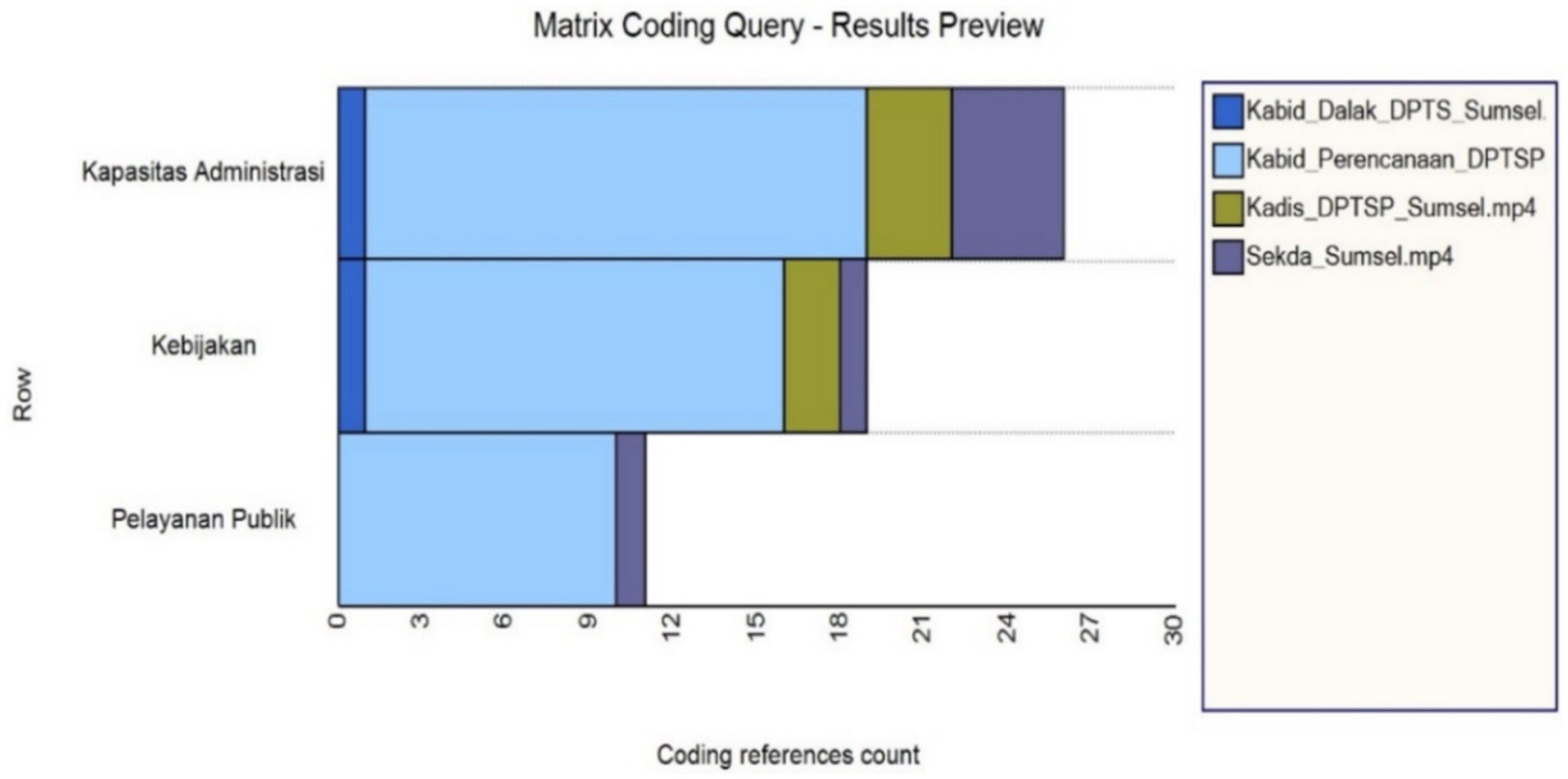
Figure 3. Matrix coding query analysis with sub-public services, administrative capacity, and policies based on interview results from research informants.
One of the most crucial dimensions in the success of FI governance is administrative capacity, which includes the quality of public services, the management of standard operating procedures (SOPs), and regional budgeting systems. The findings of the study indicate that, although formal authority is given by the central government to the governor, in practice, there is a technical delegation to the Provincial DPMPTSP, which then carries out monitoring, supervision, and control functions over the implementation of FI at the district/city level. For example, it shows seven districts that have FDI potential in terms of mining revenue, oil, gas, coal, plantations, and industries that are cultivated. In 2023, the realization of FI was targeted at 21.9 trillion, with a realization of 21.88 trillion (99.91%), which has not yet achieved the investment target for foreign investment in 2023. The realization of FI in 2023 has decreased due to the presence of several companies that have obtained permits but have not been able to realize the planned investment plan due to obstacles such as constraints on land problems, road access constraints, and the fact that the company is not operational, and the project is not as shown in Figure 4.

Figure 4. Realization of foreign investment in South Sumatra based on the achievements of the regency.
Looking at the appropriation aspects of decentralization, local governments recognize their potential to provide and improve the efficiency of public goods. Meanwhile, many regional concepts discuss the relationship between fiscal and central government supervision. This development is stated in Law Number 23 of 2014 concerning regional governments, which states that regions have autonomy. The autonomy that is regulated is in Article 1, Point 6, which states that regional autonomy is the right, authority, and obligation of autonomous regions to regulate and manage their government affairs and the interests of local communities in the unitary state system. Therefore, the researcher has unique characteristics. First, only the impact of decentralization requires that the regions have to manage themselves. However, these regions do not have authority over FI matters. This is because the FI is the authority of the central government. Second, decentralization greatly influences the perspective of government governance as well as the impact of local government governance, which is required for the achievement of central government programs in terms of fiscal investment, regional development policies, and others. Third, the relationship between the central and regional governments is a form of direction as the implementer of central government activities and policies and whether the effectiveness of regional policies is achieved. The results of the interviews in the field related to administrative capacity in FI in Indonesia are shown in Figure 5.
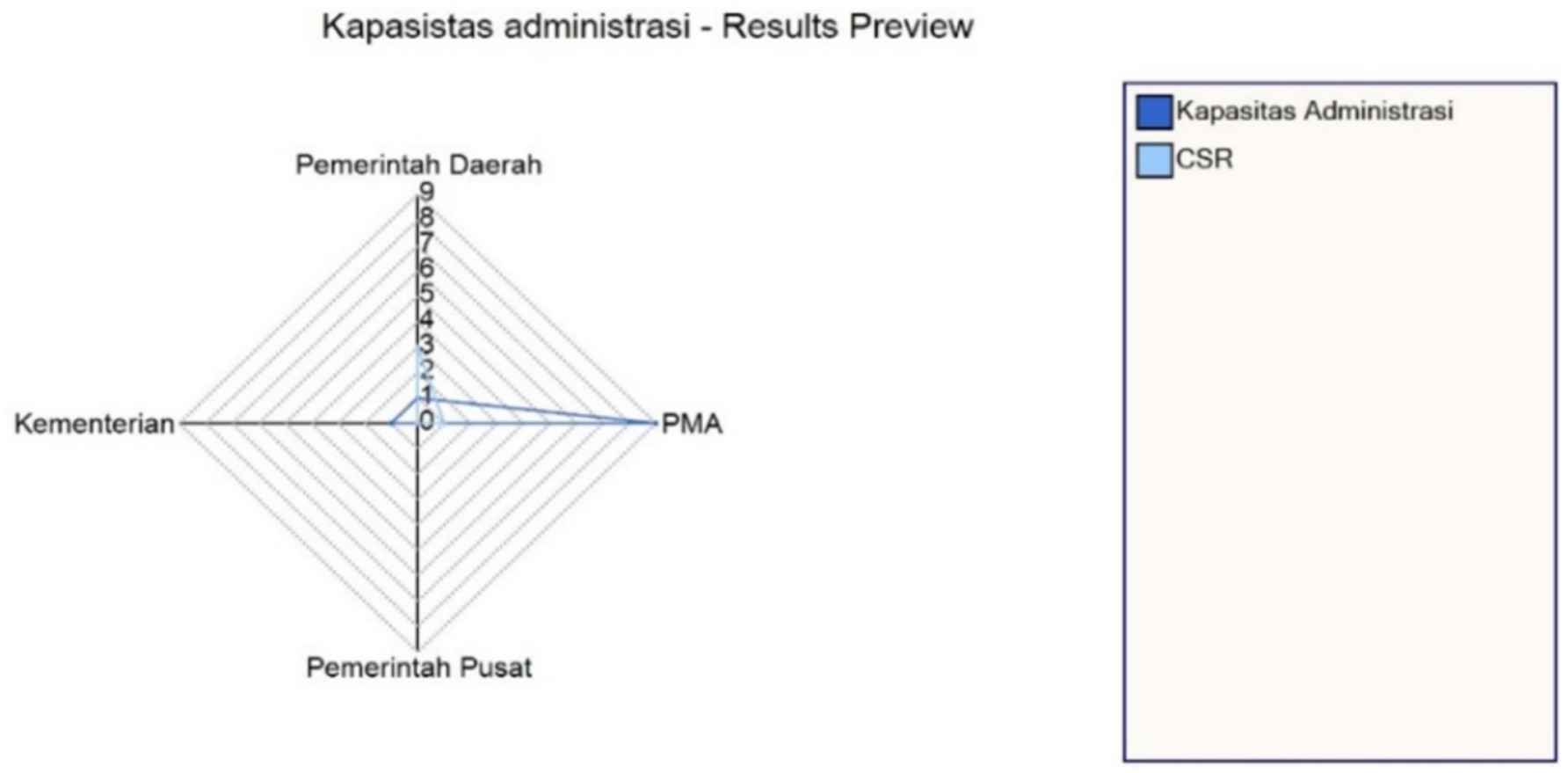
Figure 5. Results review of administrative capacity in foreign investment management institutions in South Sumatra based on interview results.
Figure 5 shows that this governance structure reflects a vertical model but remains functionally coordinated, where the South Sumatra Province DPMPTSP plays a central role as a liaison between policies formulated at the central level and their implementation at the regional level. This role emphasizes the importance of institutional effectiveness and provincial administrative capacity as determining factors for the success of FI management. Thus, the district/city government plays an important role in the FI governance process, exceeding the role of provincial and central governments in the operational context in the field. The authority and influence of local government institutions and local political actors have proven to be strong in the decision-making process, especially in the preparation of the Regional Spatial Planning (RTRW) policy, which is the basis for developing regional potential.
This finding shows the dynamics of bottom-up governance, where local actors, local governments, the private sector, and the community actively contribute to development through investment, the provision of social facilities, education, and basic infrastructure. In this context, collaboration between local governments and FI actors is the key to encouraging the welfare of local communities. The data visualization (NVivo 12 Plus) is shown in Figure 6.
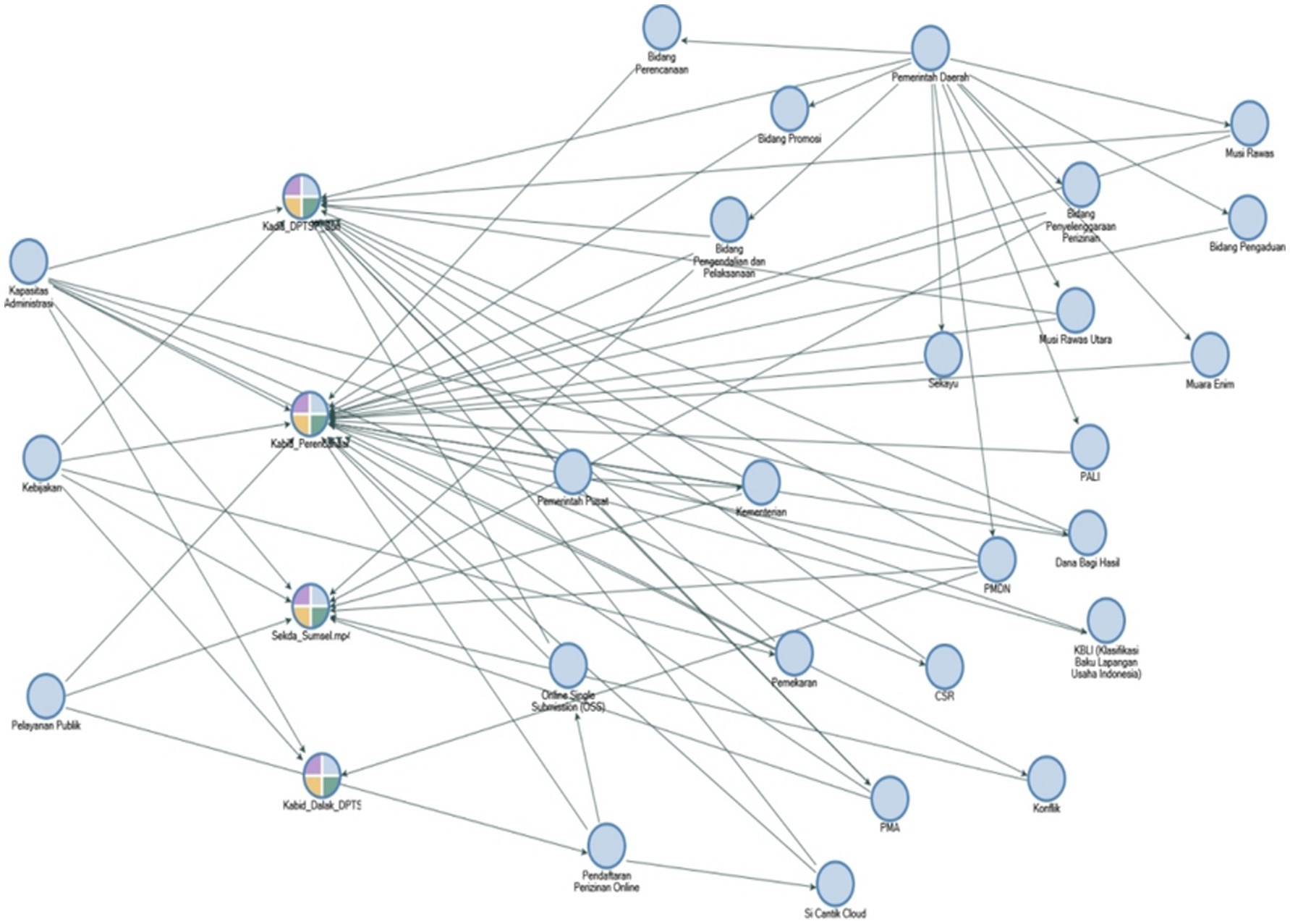
Figure 6. Shows that governance in South Sumatra implements three dimensions of governance in the planning system, resulting in the realization of good governance. Looking at the perspective of several regional government agencies to play a role and authority in FI.
At the national level, FDI policy is coordinated by the Investment Coordinating Board (BKPM) as stipulated in Article 27 of the Investment Law. BKPM is tasked with ensuring policy synergy between agencies and levels of government and is directly responsible to the president. In a deconcentration system, provincial governments act as implementers of central policies but do not have full autonomy in strategic decision-making. Therefore, synergy between central, provincial, district/city, and business actors is crucial in creating a conducive investment climate. Implementation of FDI in these regions refers to the three dimensions of governance developed by Kaufmann et al. (2002). First, Public Service Dimension: Measuring the quality of licensing, speed of service, and efficiency of the investment process. Second, Administrative Capacity Dimension: Reflecting the ability of the regional bureaucracy to respond to and facilitate investor needs. Third, Policy Dimension: Relating to the delegation of authority from the center to the regions in the form of policy mandates and adaptive regulations.
Field findings reveal an additional dimension in the form of local political culture in investment, where the role of political elites and regional officials greatly influences the direction of FI policy. This interaction involves private sector and Corporate Social Responsibility (CSR) forums within the framework of development collaboration at Provincial, Regency, and City levels. Informal communication and relations also influence the licensing process, facilitation, and strategic decision-making. Investor incomprehension negatively impacts investment activities in the region, resulting in investment failure due to the emergence of economic and social factors in the region. FDI data from 2019 to 2023 show that it harms economic growth in South Sumatra. Table 2 shows the dimensions and conceptual issues of FI in the South Sumatra region.
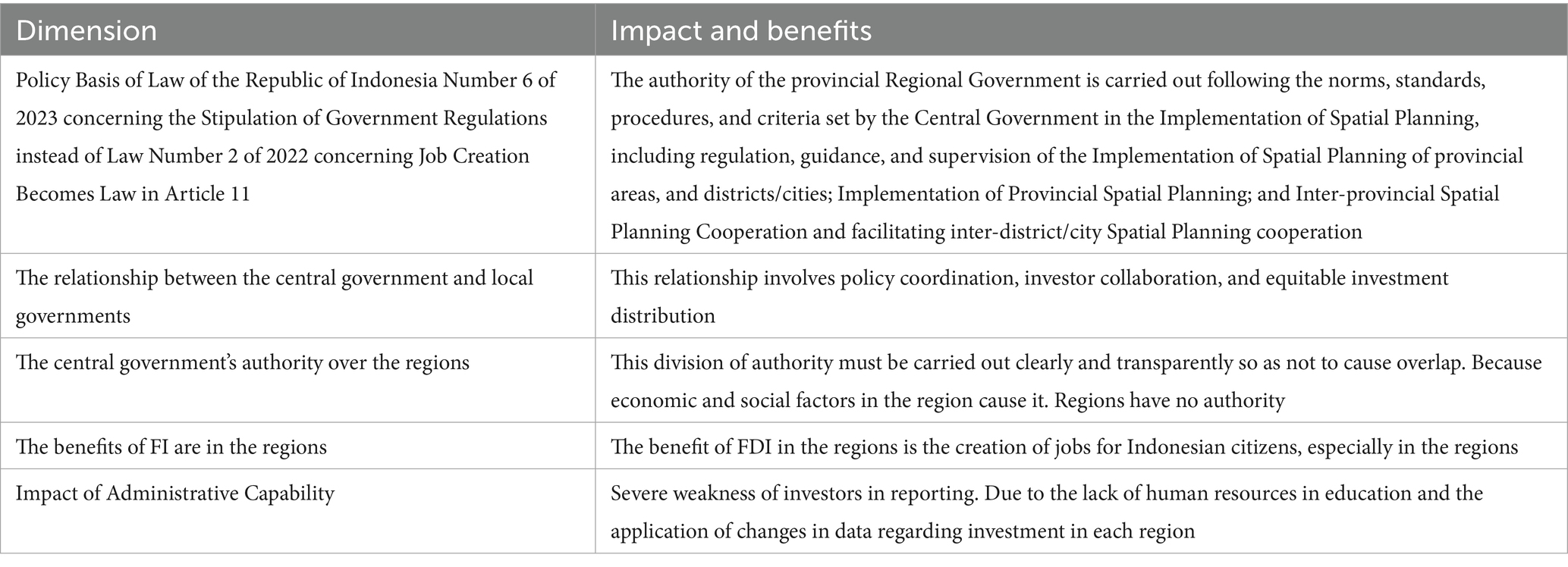
Table 2. Dimensional and conceptual issues on the impact and benefits of FDI in the local region of South Sumatra.
The researcher is interested in decentralization following Law 23 of 2014, and the research topic on decentralization in the highest publication years, 2010, 2014, and 2023, by looking at the government’s capability from the self-governance model. The distribution of articles in reputable journals also reveals how a concept represented by specific keywords has a place during discussions in Indonesia’s social and political sciences, especially FI, in the South Sumatra Province. Various laws and regulations that regulate local governments through the principles of decentralization, deconcentration, and assistance duties can be used as indicators of the size of regional authorities controlling and managing their household affairs. The greater the application of the principle of decentralization, the wider the government affairs regulated by each region. On the contrary, the greater the application of the principle of deconcentration, the smaller the application of the principle of deconcentration, and the smaller the application of government affairs regulated by each region. The study of investment development in Indonesia was based on 37 provinces, as depicted in Table 3.
The data in the table above show that the Java region occupies the first place where investors invest their capital, the second region is Central Sulawesi, the third is Kalimantan, the fourth is South Sumatra, and the fifth is Papua. As revealed by the research of Wang et al. (2019), exporting the curse of human resources that the relationship between the abundance of natural resources and economic growth is a controversial subject in various arguments. Some academics argue that natural resources encourage economic development in rich countries by increasing trade and production, while several scholars show that natural resources reduce long-term growth due to their depleted nature (Erum and Hussain, 2019; Nalle et al., 2019; Zalle, 2019). Therefore, local governments must achieve their goals of increasing the regional expenditure budget (APBD) and advancing regional development. According to Hairi (2020, p. 299), the governance and administrative processes of the Light Rail Train Project in Palembang, Indonesia. Political instability is a primary concern for Chinese investors and can hamper infrastructure investment in Indonesia. In research by Washington (2023, p. 20), an infrastructure for building policy capability—lessons from Practice argues that a policy capability infrastructure can serve as a valuable and common analytical framework for describing, assessing, and improving policy capabilities within a team, organization, or public service. Therefore, the researcher tries to focus on the perspective of governance in decentralization.
From Figure 7, the concept of decentralization in its development gets specific media in discussions related to the study of governance in Indonesia on decentralization. Several loopholes become weaknesses in local governments. For example, KPMG’s (2021) Survey of Corporate Responsibility Reporting reported that in 1999, 35% of the world’s 250 largest companies by revenue included CSR and ESG information in their annual financial statements, while approximately 90% showed the positive effects of such social care in 2021. Meanwhile, in the administration of ability in the CSR area, only a business actor invests capital in the region. Therefore, first of all, CSR only helps health, education, and community development. The second weakness is strong local government regulations regarding regional CSR policies.
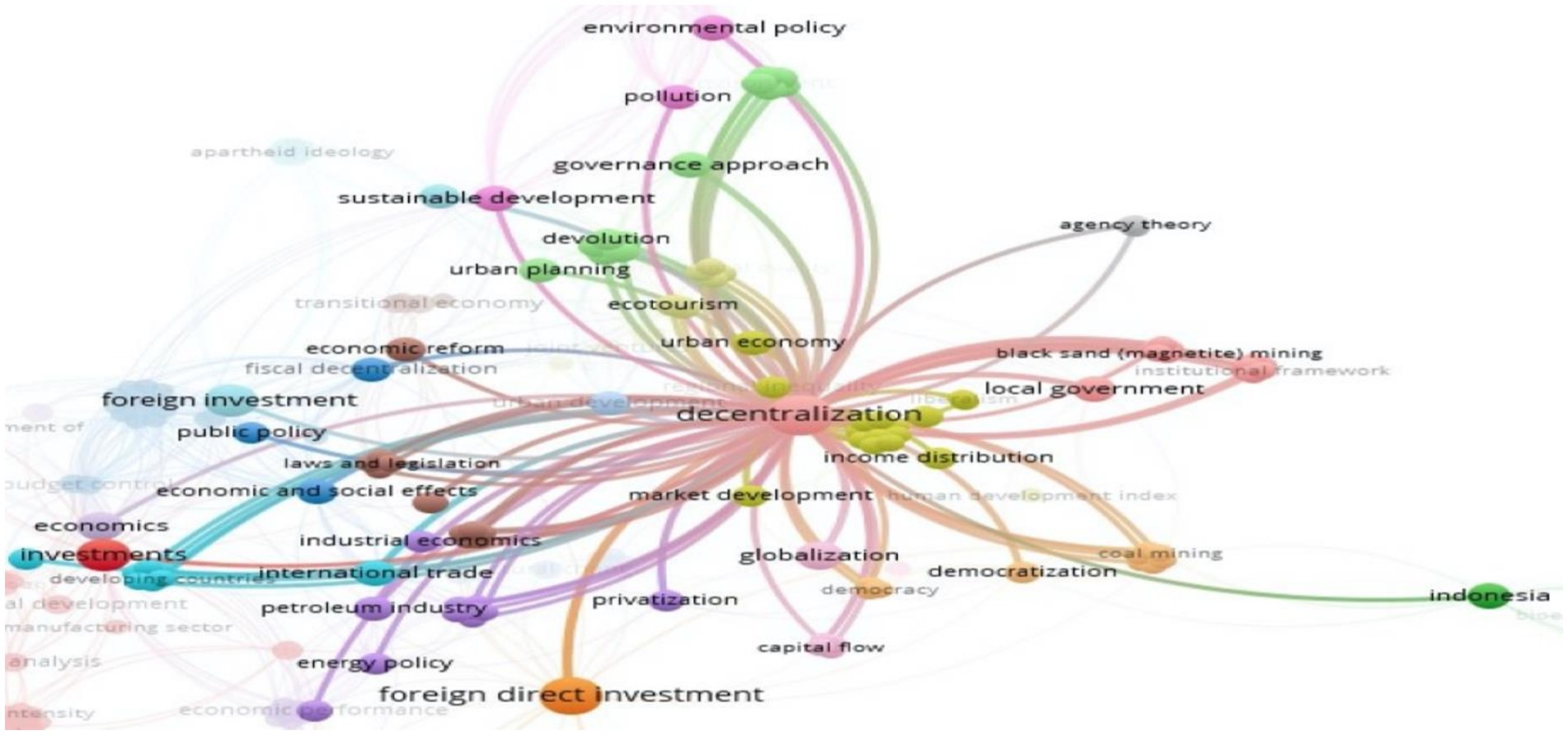
Figure 7. Research topics on decentralization in the highest publication peak years, 2010, 2014, and 2023.
Conclusion
The decentralized system for administrating this research capacity is mainly a system of authority between the central and local governments at the same level. The authority of the central government remains the same. However, because of the proactive relationship between central and regional governments, it does not implement the concept of decentralization. There are still few human resources and implementation limitations in regional policies. This study suggests that regions do not have authority over the administrative capacity of FI. Because the regions are only facilitators and supervisors who follow the central government regulations. Meanwhile, the region functions as an area with natural and human resources that can become assets in managing regional households. FI has more value than other aspects such as local and central government ministries. This is because the interview results mentioned many things related to the administrative capacity of FI. Thus, administrative capacity correlates more strongly than other indicators such as public policy and services.
Data availability statement
The datasets analyzed for this study are not publicly available due to institutional restrictions and confidentiality agreements, but they are available from the corresponding author upon reasonable request.
Author contributions
EF: Conceptualization, Data curation, Formal analysis, Funding acquisition, Investigation, Methodology, Project administration, Resources, Software, Supervision, Validation, Visualization, Writing – original draft, Writing – review & editing. BS: Supervision, Conceptualization, Methodology, Writing – review & editing. TY: Supervision, Validation, Writing – review & editing. RD: Supervision, Validation, Writing – review & editing.
Funding
The author(s) declare that no financial support was received for the research and/or publication of this article.
Conflict of interest
The authors declare that the research was conducted in the absence of any commercial or financial relationships that could be construed as a potential conflict of interest.
Generative AI statement
The authors declare that no Gen AI was used in the creation of this manuscript.
Publisher’s note
All claims expressed in this article are solely those of the authors and do not necessarily represent those of their affiliated organizations, or those of the publisher, the editors and the reviewers. Any product that may be evaluated in this article, or claim that may be made by its manufacturer, is not guaranteed or endorsed by the publisher.
References
BPS South Sumatra Province. (2023). Economic Report of South Sumatra Province 2023. Palembang: BPS South Sumatra Province.
Central Statistics Agency, Lubuklinggau City. (2023). Lubuklinggau City in Figures 2023. Lubuklinggau: BPS Lubuklinggau City.
Cheema, G. S., and Rondinelli, D. A. (2007). Decentralizing governance: Emerging concepts and practices. Washington, DC: Brookings Institution Press.
Creswell, J. W. (2013). Qualitative inquiry and research design: Choosing among five approaches. 3rd Edn. Thousand Oaks, CA: SAGE Publications.
Denzin, N. K., and Lincoln, Y. S. (2011). The SAGE handbook of qualitative research. 4th Edn. Thousand Oaks, CA: SAGE Publications.
Erum, N., and Hussain, S. (2019). The impact of natural resources on economic growth: a curse or blessing? Resources Policy 61, 151–156. doi: 10.1016/j.resourpol.2019.02.012
Fitrani, F., Hofman, B., and Kaiser, K. (2005). Unity in diversity? The creation of new local governments in a decentralising Indonesia. Bull. Indones. Econ. Stud. 41, 57–79. doi: 10.1080/00074910500072690
Fukuyama, F. (2016a). Governance and the rule of law in development. Governance 28, 265–267. doi: 10.1111/gove.12150
Government of South Sumatra Province. (2023). Governor Regulation No. 13 of 2023 concerning Amendments to the 2023 Regional Government Work Plan. Palembang: South Sumatra Provincial Government.
Hairi, M. A. (2020). Governance and administrative process of light rail transit project in Palembang, Indonesia. Jurnal Ilmu Administrasi dan Kebijakan Publik 7, 289–302.
Handoko, T. H. (2011). Personnel and Human Resource Management (2nd edition, 18th edition). Yogyakarta: BPFE.
Kaufmann, D. (2005). Myths and realities of governance and corruption. Washington, DC: World Bank Institute.
Kaufmann, D., Kraay, A., and Mastruzzi, M. (2002). Governance matters II: Updated indicators for 2000/01 (World Bank policy research working paper no. 2772). Washington, DC: World Bank.
Kaufmann, D., Kraay, A., and Mastruzzi, M. (2010). The worldwide governance indicators: Methodology and analytical issues (World Bank policy research working paper no. 5430). Washington, DC: World Bank.
Kaufmann, D., Kraay, A., and Zoido-Lobatón, P. (2000). Governance matters (World Bank policy research working paper no. 2196). Washington, DC: World Bank.
Kementerian Investasi/BKPM. (2023). Data realisasi investasi 2019–2023 berdasarkan wilayah. Jakarta: Badan Koordinasi Penanaman Modal. Available online at: https://www.bkpm.go.id.
KPMG. (2021). The time has come: The KPMG survey of sustainability reporting 2020. KPMG International. Available online at: https://home.kpmg/xx/en/home/insights/2020/11/the-time-has-come-survey-of-sustainability-reporting.html
Kuncoro, M. (2004). Otonomi dan pembangunan daerah: Reformasi, perencanaan, strategi, dan peluang. Jakarta: Erlangga.
Leonardo, D. (2011). Strengthening governance and public sector reform in Indonesia: The role of local government in public policy. Yogyakarta: Gadjah Mada University Press.
Miles, M. B., Huberman, A. M., and Saldaña, J. (2014). Qualitative data analysis: A methods sourcebook. 3rd Edn. Thousand Oaks, CA: SAGE Publications.
Nalle, V., Nugroho, H., and Fitriani, R. (2019). Natural resources, conflict, and regional development in eastern Indonesia. Jurnal Sosial Politik 6, 211–228.
NVivo (2020). NVivo 12 Plus User Guide. QSR International. Available online at: https://www.qsrinternational.com/nvivo-qualitative-data-analysis-software/home
Pemerintah Provinsi Sumatera Selatan (2023). Laporan Kinerja Instansi Pemerintah (LKJIP) Provinsi Sumatera Selatan Tahun 2023. Palembang: Biro Organisasi dan Tata Laksana.
Pemerintah Republik Indonesia (2014). “Undang-Undang Nomor 23 Tahun 2014 tentang Pemerintahan Daerah” in Lembaran Negara Republik Indonesia Tahun 2014 Nomor 244 (Jakarta: Sekretariat Negara).
Pemerintah Republik Indonesia. (2023). Undang-Undang Nomor 6 Tahun 2023 tentang Penetapan Peraturan Pemerintah Pengganti Undang-Undang Nomor 2 Tahun 2022 tentang Cipta Kerja menjadi Undang-Undang. Lembaran Negara Republik Indonesia Tahun 2023 Nomor, 38.
Sedarmayanti. (2011). Human Resource Management, Bureaucratic Reform, and Civil Servant Management (5th edition). Bandung: PT Refika Aditama.
Smoke, P. (2003). Decentralisation in Africa: goals, dimensions, myths and challenges. Public Adm. Dev. 23, 7–16. doi: 10.1002/pad.255
Sugiyono. (2019). Quantitative, Qualitative, and R&D Research Methods (27th edition, October). Bandung: Alfabeta.
Turner, M., and Hulme, D. (1997). Governance, administration and development: Making the state work. London: Palgrave Macmillan.
Wang, R., Liu, Y., and Zhang, L. (2019). Exporting the curse of natural resources: evidence from Chinese mining investment in Africa. World Dev. 122, 96–109. doi: 10.1016/j.worlddev.2019.05.015
Washington, S. (2023). An infrastructure for building policy capability: lessons from practice. Policy Design Pract. 6, 19–35. doi: 10.1080/25741292.2023.2166543
Widiwati, T. L., Nurhayati, D., and Anjani, R. (2023). Tata kelola desentralisasi investasi asing: Studi kebijakan pemerintahan daerah di Indonesia. Bandung: Pustaka Setia.
Widiwati, L., Santosa, S., and Nugroho, Y. (2023). Governance dalam perspektif desentralisasi: Studi kasus penanaman modal asing di Indonesia. Jakarta: LIPI Press.
Yin, R. K. (2018). Case study research and applications: Design and methods. 6th Edn. Thousand Oaks, CA: SAGE Publications.
Zalle, N. (2019). Natural resource dependence and economic growth in sub-Saharan Africa. Resources Policy 62, 437–452. doi: 10.1016/j.resourpol.2019.04.010
Keywords: governance, administrative decentralization, foreign direct investment (FDI), Indonesia, institutional perspective
Citation: Farhan EK, Setiyono B, Yuwono T and Dewi RS (2025) Governance perspective: foreign investment in decentralization in Indonesia. Front. Polit. Sci. 7:1562656. doi: 10.3389/fpos.2025.1562656
Edited by:
Ibnu Sina Chandranegara, Muhammadiyah University of Jakarta, IndonesiaReviewed by:
Dwi Putri Cahyawati, Trisakti University, IndonesiaAhmad Ahmad, Universitas Muhammadiyah Tangerang, Indonesia
Copyright © 2025 Farhan, Setiyono, Yuwono and Dewi. This is an open-access article distributed under the terms of the Creative Commons Attribution License (CC BY). The use, distribution or reproduction in other forums is permitted, provided the original author(s) and the copyright owner(s) are credited and that the original publication in this journal is cited, in accordance with accepted academic practice. No use, distribution or reproduction is permitted which does not comply with these terms.
*Correspondence: Eva Kurnia Farhan, ZXZha3VybmlhZmFyaGFuQHN0dWRlbnQudW5kaXAuYWMuaWQ=; a2lraWV2YTIwMjNAZ21haWwuY29t
 Eva Kurnia Farhan
Eva Kurnia Farhan Budi Setiyono2
Budi Setiyono2